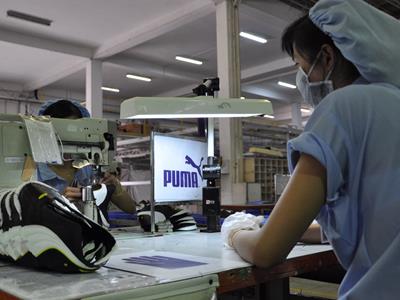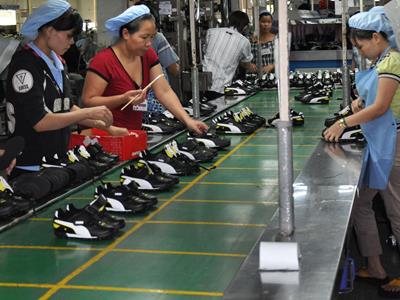A commitment to Fair wage as part of human rights and sustainability principles
PUMA has made public commitments in different wage areas, first to pay a living wage ‘to cover worker’s basic needs plus some discretionary income’, and then also to report on progress towards achieving this aim.
At the same time, PUMA states in its Code of Conduct that its suppliers should pay the statutory minimum wage or the prevailing industry wage whatever is higher between the two. Freedom of association is also mentioned, and Puma’s Code of Conduct also presents the main principles of its nondiscrimination policy that covers also wage differentials.
PUMA is also active to apply such principles to suppliers’ reality through its programme of internal audits and monitoring of its supply chain, and through external audits carried out by the Fair Labor Association in which they are an active member.

Initial Fair Wage assessments in five sourcing countries in Asia
Improving wages of factory workers in its supply chain in Asia represents a core issue on PUMA’s way to ensure sustainable workplace improvement. PUMA started by trying to get a comprehensive overview of wage practices among its suppliers in Asia by asking the Fair Wage Network (in cooperation with the Fair Labor Association) to conduct Fair Wage assessments in five countries and covering 28 factories.
On the basis of this assessment work that was carried out in 2012-2013, the FWN developed individual roadmaps for each supplier, and then conducted in-depth case studies in three Indonesian factories, engaging directly with the management and the workers through technical assistance, training sessions and concrete solutions on how to generate wage improvements.

Strengthening wages within Human Resources Managements Systems
Around the same time, Puma engaged in a Human Resources Management System project with Better Work in Vietnam and Cambodia covering 16 factories and 30,504 workers. Launched in 2012, the project focused on the enhancement of human resource management systems to help address worker concerns including on fair wage issues.
PUMA in 2014 also launched its ‘Better Wages Program’ that was also based on the 12 Dimensions of Fair Wages developed by the Fair Wage Network. It also included direct engagement with factory management, worker representative organizations, and PUMA’s internal stakeholders to improve compensation systems, notably through collective dialogue and efficiency incentives structures.

Remediation programme in pilot factories in Indonesia
Case studies were carried out for one year-long remediation in three factories in Indonesia that was selected as a test site because also signatory of the Freedom of Association Protocol. The project aimed at improving wage-fixing mechanisms and pay systems, at developing a closer link between wages and workers’ skills and performance, and also at putting in place a better wage-adjustment process notably to price increases through proper collective bargaining on wages issues. A number of concrete improvements could be achieved.
In terms of social dialogue, one key achievement was the definition and agreement in each factory of their respective one-year Fair Wage Implementation Plan between the management and workers’ representatives in a social context that was not optimal for the signature of such type of agreement.
Both sides were also jointly involved in the implementation of the Fair Wage remediation plan, something that not only led both employers and workers to acquire more knowledge of wage issues but also stimulated communication and informational flows between them. Many of the outcomes of this project could not have been achieved without such interaction between the management and the workers.
This remediation exercise first led to significant progress in the area of pay systems, with for instance the reform of an attendance bonus in one factory (that was originally lost even when workers had sickness certificates) or the introduction of a bonus related to collective performance in another factory.
The wage structure was generally improved in the three factories with a better balance between fixed and variable pay, and with the introduction of a wage grid system that led the basic wage to better reflect workers’ education, professional experience and skills. Such improvements in pay systems (wages closer to skills, adjusted to price increases etc.) also served as levers to progressively increase wage levels that improved in comparison to living wage thresholds.
In this respect, factories’ behavior on the payment of the minimum wage also helped: at the moment of the increase of the statutory minimum wage, all three factories, through negotiations with workers’ representatives and as part of their Fair Wage implementation plan, decided to immediately apply such increase although some minimum wage temporary exemptions were legally allowed by the government (that the factories decided not to use).
Sources of wage differentials between different categories of workers (notably between directly and indirectly employed employees) were also reduced and thus helped factories to improve also in terms of wage disparity.
Finally, communication between the management and the workers also improved significantly with workers getting more involved in discussions and decisions about their bonuses and benefits.
New Fair Wage assessment exercise in Bangladesh
More recently, in 2018, PUMA also asked the FWN to conduct Fair Wage assessments among few of its key suppliers in Bangladesh, first to better know their performance on the 12 Fair Wage dimensions, and then to identify possible areas where some remediation would be required. The exercise took place in a pilot sample of 7 suppliers in different regions of Bangladesh, with 655 workers being interviewed.
According to survey results, the average wage among the seven factories under coverage was generally higher than market rates although some of them were found to have difficulties to reach a living wage threshold. It was also positive that a number of factories had put in place some institutional elements such as wage grids and schemes relating pay to performance.
At the same time, similar developments were not always reported on social dialogue, with workers’ representatives not always involved in wage discussions, and with collective agreements being rarely signed at factory level, something that gave PUMA valuable information for follow-up and remediation.
Overall, workers’ satisfaction about wages and working conditions was found to be relatively good, with almost all workers being either ‘fully’ or ‘partly’ satisfied about their wages and working conditions, with also encouraging results on retention and turnover rates.
Propensity of workers to stay at least one more year was rather high. The performance of two factories -including on the living wage front- were particularly outstanding so that they were granted the Fair Wage certification. The other remaining factories were invited to engage in a remediation process for improving their performance in the wage areas that were found to be less strong.
More assessments of this type would certainly be required in other factories and in other markets to progressively help other PUMA suppliers to progressively move towards fairer wage levels and practices.

